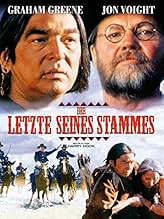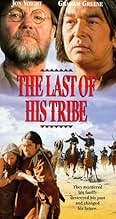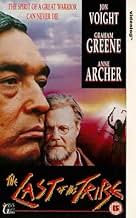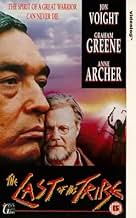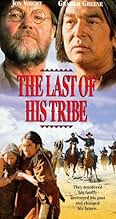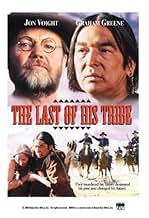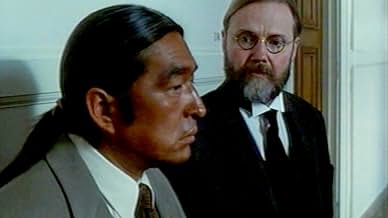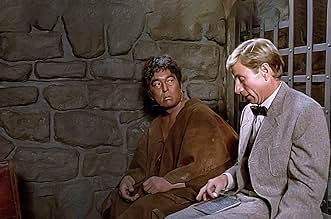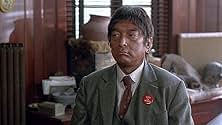Ishi, the last Yahi Indian of California, must leave his homeland and learn to navigate the world of the white man in order to survive.Ishi, the last Yahi Indian of California, must leave his homeland and learn to navigate the world of the white man in order to survive.Ishi, the last Yahi Indian of California, must leave his homeland and learn to navigate the world of the white man in order to survive.
- Awards
- 2 wins & 3 nominations total
Charles Martinet
- Assistant Museum Director
- (as Charles A. Martinet)
Benne Alder
- Mrs. Whatley
- (as Benne B. Adler)
- Director
- Writer
- All cast & crew
- Production, box office & more at IMDbPro
Featured reviews
I usually try to avoid overstating my case, but this is probably the worst film ever made. The true story of Ishi is a story of a life well lived and a sensitive ambassador of one culture to another. But this film is so full of falsehoods about Ishi, and clichés about Native Americans, that it should probably be banned. And I have never said that before about any work of art or literature.
Until his encounter with the Saltu (us), Ishi was merely a good citizen (so to speak) of his harassed and harried nation, simply doing what he was supposed and expected to do as a Yana man. Period. After that encounter, he took up his destiny as a bridge between two utterly different cultures and fulfilled it with dignity and competence. He did NOT at any time freak out and run around shouting "No! No!"---what baloney! Almost everyone who knew him commented on the low-keyed, self-controlled manner in which he conducted himself in his strange surroundings. He never lost his cool. Nor did he babble ridiculous Hollywood-Indian clichés about "our Mother Earth", etc., as appears in the film. The most insulting lie in the film is the sequence in which Pope (who was, by the way, certainly not the clownish idiot portrayed here) brings in a prostitute to service Ishi. Actually, Ishi had much too great a sense of dignity to indulge in any such thing, and was always very cool and formal in the presence of women, as his culture demanded.
The portrayal of Kroeber is almost as offensive. The film makes him into a stereotype of the emotionally starved anthropologist who regards Indians coldly as mere objects of study, and allows him to really respect Ishi only after the latter is dead. Again, nonsense. Kroeber did use the kind of language that was common in his day: he wrote that when Ishi made his first acquaintance with Saltu society "he was absolutely ignorant" (of Saltu ways, that is), and used unfortunate expressions like "wild Indian." But everybody knew what he meant. He and Ishi were friends, and Kroeber made it clear that knowing Ishi was one of the great experiences of his life---Ishi, he made clear, not as an object of study but as a warm, generous and gracious human being. There is no evidence that Kroeber's wife Henrietta looked down her nose at Ishi or that she was the racist snob depicted in the film. In fact, as Kroeber's second wife Theodora recorded in her memoirs, Ishi's sensitivity and compassion helped Kroeber greatly in dealing with Henrietta's death. I guess the makers of this film avoided depicting that because it would have interfered with their disorted portrayal of Kroeber as an insensitive lout. (Speaking of Theodora, she wrote two very readable and informative accounts of the life of Ishi, whom she had never met, consulting extensively with her husband. And by the way, these two were the parents of the fantasy writer Ursula K. LeGuinn.)
If only this film had been based on Theodora's writing! This film, I say again, is an atrocity. It makes me so angry that I feel like committing mayhem.
Until his encounter with the Saltu (us), Ishi was merely a good citizen (so to speak) of his harassed and harried nation, simply doing what he was supposed and expected to do as a Yana man. Period. After that encounter, he took up his destiny as a bridge between two utterly different cultures and fulfilled it with dignity and competence. He did NOT at any time freak out and run around shouting "No! No!"---what baloney! Almost everyone who knew him commented on the low-keyed, self-controlled manner in which he conducted himself in his strange surroundings. He never lost his cool. Nor did he babble ridiculous Hollywood-Indian clichés about "our Mother Earth", etc., as appears in the film. The most insulting lie in the film is the sequence in which Pope (who was, by the way, certainly not the clownish idiot portrayed here) brings in a prostitute to service Ishi. Actually, Ishi had much too great a sense of dignity to indulge in any such thing, and was always very cool and formal in the presence of women, as his culture demanded.
The portrayal of Kroeber is almost as offensive. The film makes him into a stereotype of the emotionally starved anthropologist who regards Indians coldly as mere objects of study, and allows him to really respect Ishi only after the latter is dead. Again, nonsense. Kroeber did use the kind of language that was common in his day: he wrote that when Ishi made his first acquaintance with Saltu society "he was absolutely ignorant" (of Saltu ways, that is), and used unfortunate expressions like "wild Indian." But everybody knew what he meant. He and Ishi were friends, and Kroeber made it clear that knowing Ishi was one of the great experiences of his life---Ishi, he made clear, not as an object of study but as a warm, generous and gracious human being. There is no evidence that Kroeber's wife Henrietta looked down her nose at Ishi or that she was the racist snob depicted in the film. In fact, as Kroeber's second wife Theodora recorded in her memoirs, Ishi's sensitivity and compassion helped Kroeber greatly in dealing with Henrietta's death. I guess the makers of this film avoided depicting that because it would have interfered with their disorted portrayal of Kroeber as an insensitive lout. (Speaking of Theodora, she wrote two very readable and informative accounts of the life of Ishi, whom she had never met, consulting extensively with her husband. And by the way, these two were the parents of the fantasy writer Ursula K. LeGuinn.)
If only this film had been based on Theodora's writing! This film, I say again, is an atrocity. It makes me so angry that I feel like committing mayhem.
This is a true story. It is more emotional than a soap opera and, yet, unflinchingly genuine.
Just as was depicted in this film, Ishii stumbled into a white man's barn near Oroville, California, in 1911. He later told Kroeber that he expected nothing but death. Graham Greene's portrayal of a soft-spoken primitive gentleman is delightful. Greene's Ishii speaks English only after a fashion.
If you have the time, look up Kroeber's story of Ishii in the "Handbook of California Indians".
Just as was depicted in this film, Ishii stumbled into a white man's barn near Oroville, California, in 1911. He later told Kroeber that he expected nothing but death. Graham Greene's portrayal of a soft-spoken primitive gentleman is delightful. Greene's Ishii speaks English only after a fashion.
If you have the time, look up Kroeber's story of Ishii in the "Handbook of California Indians".
For the record, I am not Jen, but her sister Kathleen.
I saw this movie in an English class after reading "Black Elk Speaks." It is a solemn statement about the sad plight of dying Native American tribes. Graham Greene's character is a poor hungry Native American who has lost his family and is found trying to steal food from a small farm. A kind-hearted doctor takes him in and attempts to educate him to the ways of the white man. The middle-aged native is seduced by the prosperity of this new world, and even has an unexpected encounter with a prostitute, much to the dismay of his new guardian, the doctor. But the distractions of this new world are not enough to erase the sadness of this man who has lost his family, his tribe, and his history. In a striking scene in which the native leads his new friend to the wilderness he once called home, the native sings a mournful tribal chant in remembrance of the family and tribe that was forever gone. It is an emotionally moving film for those who feel compassion for the Native American and I recommend it to viewers who enjoy a film with a message.
I saw this movie in an English class after reading "Black Elk Speaks." It is a solemn statement about the sad plight of dying Native American tribes. Graham Greene's character is a poor hungry Native American who has lost his family and is found trying to steal food from a small farm. A kind-hearted doctor takes him in and attempts to educate him to the ways of the white man. The middle-aged native is seduced by the prosperity of this new world, and even has an unexpected encounter with a prostitute, much to the dismay of his new guardian, the doctor. But the distractions of this new world are not enough to erase the sadness of this man who has lost his family, his tribe, and his history. In a striking scene in which the native leads his new friend to the wilderness he once called home, the native sings a mournful tribal chant in remembrance of the family and tribe that was forever gone. It is an emotionally moving film for those who feel compassion for the Native American and I recommend it to viewers who enjoy a film with a message.
I believed Graham Greene did well portraying Ishi since he easily blended in with the character's storyline. I found it interesting how the anthropologist he befriended became so familiar with his Native language so soon! I think he wasn't like any other white anthropologist who wasn't interested in truly getting to know the people whose cultures he was studying. He really had a genuine liking for Ishi and as a result their friendship became very deep.
Well........ anyways........... that's the reason why I gave this film a 6 out of 10.
Well........ anyways........... that's the reason why I gave this film a 6 out of 10.
I sought out this HBO movie because I just recently watched an episode of "The American Experience" that was all about this same man and his discovery at about 1900 (Ishi: The Last Yahi Indian (#5.8)"). It seems that there was a very small tribe in California that the White folks didn't know about--and their existence was only discovered when the last of them, Ishi, wandered into town! While I am no where as familiar with the story as tom_amity@hotmail.com, I would not consider this 'probably the worst film ever made'. I would be loathe to call ANY film this, actually, and I can think of hundreds of films (such as those of Ed Wood, Ray Dennis Steckler, Arch Hall and Ted Mikels) that are truly among the worst ever made--and "The Last of His Tribe" would not even come close. Perhaps it might be faulted from taking liberties with the true story (and as a history teacher, I hate this), but so have thousands of other films. But when it comes to completely dismissing history, this HBO film doesn't even come close to films like "Pocahontas" or "They Died With Their Boots On" or the VERY anti-Semitic Nazi film "Jud Süß". No, to me, calling this film the worst film ever made just sounds like a lot of hyperbole. I COULD understand many faults he found with the film (especially since the film SHOULD have been based on Kroeber's widow's writings and they did misrepresent Kroeber in some ways), but 'the worst'....no. In fact, if I were to be a filmmaker today, I probably wouldn't even try making a film about Native Americans today. After all, even if you try to get the story right, you'll probably get ripped apart by someone--even if you try to get the story right.
Overall, I enjoyed the film and thought it pretty good. I did think that Graham Greene's zombie-like expressions/behavior did seem a bit odd. While Ishi was not a loud and boisterous guy, in the film he seemed practically catatonic at times. But the essence of Ishi's life with White America came through and the film was entertaining and most enlightening.
By the way, think twice before you see this or have kids see it--the autopsy scenes are a bit vivid.
Overall, I enjoyed the film and thought it pretty good. I did think that Graham Greene's zombie-like expressions/behavior did seem a bit odd. While Ishi was not a loud and boisterous guy, in the film he seemed practically catatonic at times. But the essence of Ishi's life with White America came through and the film was entertaining and most enlightening.
By the way, think twice before you see this or have kids see it--the autopsy scenes are a bit vivid.
Did you know
- TriviaA TV movie for the HBO network.
- ConnectionsFeatured in The 50th Annual Golden Globe Awards (1993)
Details
- Runtime
- 1h 31m(91 min)
- Color
- Aspect ratio
- 1.85 : 1
Contribute to this page
Suggest an edit or add missing content

